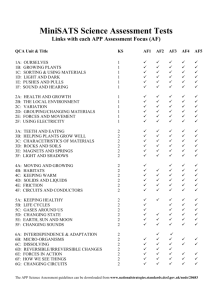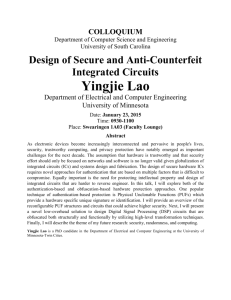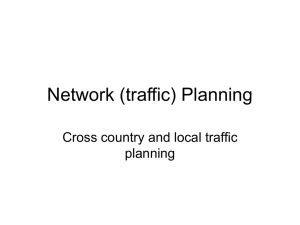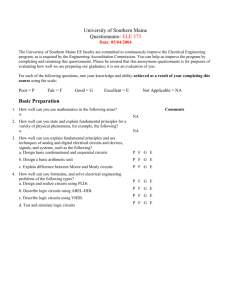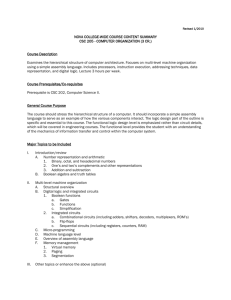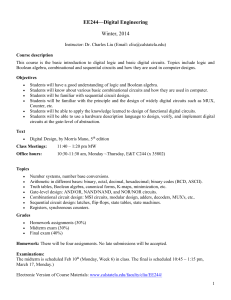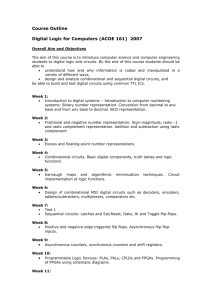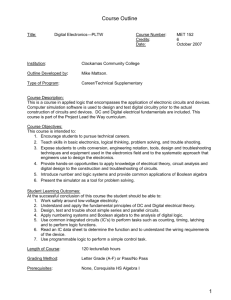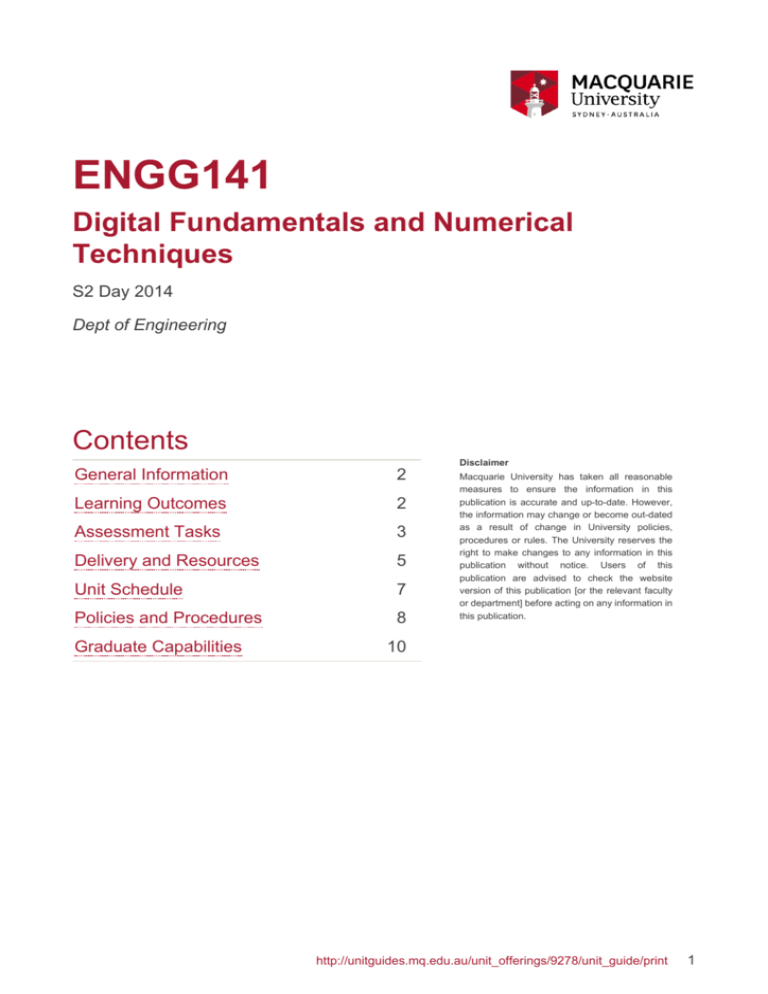
ENGG141
Digital Fundamentals and Numerical
Techniques
S2 Day 2014
Dept of Engineering
Contents
General Information
2
Learning Outcomes
2
Assessment Tasks
3
Delivery and Resources
5
Unit Schedule
7
Policies and Procedures
8
Graduate Capabilities
Disclaimer
Macquarie University has taken all reasonable
measures to ensure the information in this
publication is accurate and up-to-date. However,
the information may change or become out-dated
as a result of change in University policies,
procedures or rules. The University reserves the
right to make changes to any information in this
publication without notice. Users of this
publication are advised to check the website
version of this publication [or the relevant faculty
or department] before acting on any information in
this publication.
10
http://unitguides.mq.edu.au/unit_offerings/9278/unit_guide/print
1
Unit guide ENGG141 Digital Fundamentals and Numerical Techniques
General Information
Unit convenor and teaching staff
Unit Convenor
Gengfa Fang
gengfa.fang@mq.edu.au
Contact via 98509124
E6B Room 106
Lecturer
Rein Vesilo
rein.vesilo@mq.edu.au
Contact via rein.vesilo@mq.edu.au
Credit points
3
Prerequisites
Corequisites
Co-badged status
Unit description
This unit aims to provide an understanding of digital fundamentals to form a foundation for
study programs in science, technology, computing and engineering. The unit is also suitable
for programs in commerce, finance, economics, law, and arts as an introduction to the
technology of computer systems. Topics in this unit, including associated laboratory work,
cover: basic theory; digital devices; and procedures for the analysis and synthesis of digital
circuits and systems. The unit aims to give an appreciation of hardware aspects of design,
and provides the foundations for more advanced units on Programmable Logic Design,
Computer Hardware and Digital Systems Design. The unit includes six presentations
providing overviews of key areas of digital technology.
Learning Outcomes
1. Ability to synthesise "combinational circuits" given "truth tables", and synthesise
"sequential circuits" given "state transition diagrams"
2. Ability to analyse Boolean equations and to derive equivalent circuit diagrams
3. Ability to apply Boolean identities and Karnaugh maps to the minimisation of digital
circuits
http://unitguides.mq.edu.au/unit_offerings/9278/unit_guide/print
2
Unit guide ENGG141 Digital Fundamentals and Numerical Techniques
4. Understand what flip-flops are and be able to use them to construct a range of circuits
requiring memory capability such as counters, registers and state machines.
5. Basic understanding of the functionality of medium-scale integrated circuits, arithmeticlogic-units of computers, memory systems, analogue-digital converters
6. Able to connect digital logic circuits together in a laboratory setting, ensure that the
circuits operate correctly, apply test inputs and understand and evaluate the circuits
outputs and operation
7. Ability to evaluate alternative digital systems based on criteria such as "propagation
delay", "clock frequency", "number of components", "integration level"
Assessment Tasks
Name
Weighting
Due
Final examination
60%
Examination period
Practicals
25%
Throughout semester
Assignments
15%
Roughly every two weeks
Final examination
Due: Examination period
Weighting: 60%
3-hour
This Assessment Task relates to the following Learning Outcomes:
• Ability to synthesise "combinational circuits" given "truth tables", and synthesise
"sequential circuits" given "state transition diagrams"
• Ability to analyse Boolean equations and to derive equivalent circuit diagrams
• Ability to apply Boolean identities and Karnaugh maps to the minimisation of digital
circuits
• Understand what flip-flops are and be able to use them to construct a range of circuits
requiring memory capability such as counters, registers and state machines.
• Basic understanding of the functionality of medium-scale integrated circuits, arithmeticlogic-units of computers, memory systems, analogue-digital converters
• Able to connect digital logic circuits together in a laboratory setting, ensure that the
circuits operate correctly, apply test inputs and understand and evaluate the circuits
outputs and operation
http://unitguides.mq.edu.au/unit_offerings/9278/unit_guide/print
3
Unit guide ENGG141 Digital Fundamentals and Numerical Techniques
• Ability to evaluate alternative digital systems based on criteria such as "propagation
delay", "clock frequency", "number of components", "integration level"
Practicals
Due: Throughout semester
Weighting: 25%
This Assessment Task relates to the following Learning Outcomes:
• Ability to synthesise "combinational circuits" given "truth tables", and synthesise
"sequential circuits" given "state transition diagrams"
• Ability to analyse Boolean equations and to derive equivalent circuit diagrams
• Ability to apply Boolean identities and Karnaugh maps to the minimisation of digital
circuits
• Understand what flip-flops are and be able to use them to construct a range of circuits
requiring memory capability such as counters, registers and state machines.
• Basic understanding of the functionality of medium-scale integrated circuits, arithmeticlogic-units of computers, memory systems, analogue-digital converters
• Able to connect digital logic circuits together in a laboratory setting, ensure that the
circuits operate correctly, apply test inputs and understand and evaluate the circuits
outputs and operation
Assignments
Due: Roughly every two weeks
Weighting: 15%
Four short assignments (total weight 7.5%) and two longer assignments (total weight 7.5%).
This Assessment Task relates to the following Learning Outcomes:
• Ability to synthesise "combinational circuits" given "truth tables", and synthesise
"sequential circuits" given "state transition diagrams"
• Ability to analyse Boolean equations and to derive equivalent circuit diagrams
• Ability to apply Boolean identities and Karnaugh maps to the minimisation of digital
circuits
• Understand what flip-flops are and be able to use them to construct a range of circuits
requiring memory capability such as counters, registers and state machines.
• Basic understanding of the functionality of medium-scale integrated circuits, arithmeticlogic-units of computers, memory systems, analogue-digital converters
http://unitguides.mq.edu.au/unit_offerings/9278/unit_guide/print
4
Unit guide ENGG141 Digital Fundamentals and Numerical Techniques
• Ability to evaluate alternative digital systems based on criteria such as "propagation
delay", "clock frequency", "number of components", "integration level"
Delivery and Resources
Required unit materials:
• Text book
• Tutorial and laboratory notes
• Laboratory log book
Textbook
Floyd, T. L. "Digital Fundamentals", 10th ed, (Pearson Prentice-Hall, 2009)
Reference books
Another book that follows the treatment of ELEC141 closely is:
Tocci, Widmer and Moss, "Digital systems: principles and applications", 10th ed (Pearson PrenticeHall)
Notes
Tutorial and laboratory notes for practical tutorial session are available on iLearn. Each student is
required to print out the lab notes before each Practical.
Recommended readings
• Floyd, Chapters 1-9 (covered in detail)
• Floyd, Chapters 10, 11, 13 (overview lectures)
Technology used and required
Logic trainers for digital fundamentals and small/medium-scale integrated circuits. Access to a
computer device to access iLearn, view video modules, and do online quizzes.
Assumed knowledge
None
Assignments
There will be 6 assignments. The assignments will be available on iLearn. The due dates for the
assignments are:
• Assignment 1 – Due: Week 3
• Assignment 2 – Due: Week 5
• Assignment 3 – Due: Week 7
http://unitguides.mq.edu.au/unit_offerings/9278/unit_guide/print
5
Unit guide ENGG141 Digital Fundamentals and Numerical Techniques
• Assignment 4 – Due: Week 9
• Assignment 5 – Due: Week 11
• Assignment 6 – Due: Week 13
See iLearn for precise dates and times.
You must sign each assignment as being substantially your own work. This does not mean that you
may not consult staff or other students, but it does preclude work that is blindly copied from others.
Extension Requests
Must be supported by evidence of medical conditions or misadventure.
Satisfactory completion
A pass mark in each of the assessment components (practicals, assignments, examinations) is
required to pass the unit.
Online lectures
Except for the first lecture in Week 1, all lecture material will be delivered as as online video
modules (similar to youtube) through iLearn . Each module is approximately from 5 min to 15 min
in duration with a number of modules comprising a topic. Students will be required to view the
video modules that are identified for that week and then answer a short online quiz for each module.
Lectures slides are also available for viewing.
Video modules and practical attendance
To be able to attend a particular practical session and do the work there the video modules identified
for that practical in iLearn must have been viewed and the quizes for each of the modules passed.
Tutorial/practical sessions
There are eleven practical sessions (each of three hours duration) starting in Week 3. Students will
work in groups of two, and will attend one practical session in each week. Most practical sessions
will contain both tutorial work and laboratory work. Students are advised to attempt the tutorial
work before attending each practical session.
On the completion of each session, each group must complete and submit a “check-list” that
itemizes each section of tutorial and laboratory work. Each item is to be initialed by the group
members on completion of the work. The check-list will also have (on its reverse side) one problem
for which the group must solve. Your ability to solve this problem is considered an important
“outcome” of the practical. Your performance as recorded in your copies of the practical notes and
summarized by your check-list will be used in the assessment of your practical work.
Food and drink are not permitted in the laboratory. Students will not be permitted to enter the
laboratory without appropriate footwear. Thongs and sandals are not acceptable.
http://unitguides.mq.edu.au/unit_offerings/9278/unit_guide/print
6
Unit guide ENGG141 Digital Fundamentals and Numerical Techniques
Laboratory log book
Each student must have a bound exercise book to be used as a tutorial/laboratory note book. This
book is to be used for any preliminary work for the laboratory sessions and for any designs or
results recorded during these sessions. On the completion of each session note book entries must be
signed and dated by a tutor.
Tutor consultation
Although no face-to-face lectures will be given (except week 1), the lecture time will be devoted to
tutor consultations. During that 2 hour period tutor swill be available at a given location (TBD) to
give assistance to students.
Tutor consultation periods will begin in week 2.
Changes from previous years' offerings
All the assignments will be online.
Unit Schedule
Week
Topics
Practicals
Lecturer
1
Introductory digital concepts
No practical
GF
No practical
GF
Boolean algebra and logic
identities
Practical 1
GF
K-maps and logic
simplification using K-maps
Practical 2
Combinational logic
Practical 3
Adders, subtractors
K-maps, logic minimisation and circuit
implementation
Number systems
2
Code conversion, binary
arithmetic,
Logic functions and IC logic
gates
3
4
5
Number systems & logic gates
GF
Boolean algebra & logic gates
GF
http://unitguides.mq.edu.au/unit_offerings/9278/unit_guide/print
7
Unit guide ENGG141 Digital Fundamentals and Numerical Techniques
6
Comparators
Practical 4
Combinational circuit implementation
using integrated circuits
Multiplexers/demultiplexers
7
Latches
Practical 5
GF
RV
XOR gate applications
8
Edge-triggered flip-flops
No Prac: Labour Day Long Weekend
RV
9
Asynchronous counters
Practical 6
RV
Encoder/decoder circuit
10
Synchronous binary counters
Practical 7
RV
Flip-flops
11
12
Synchronous counter analysis
and design
Practical 8
RV
Binary counters & multiplexer/
demultiplexer circuit
Shift registers
Practical 9
RV
Synchronous counter design
13
Revision
Practical 10
GF
Finite state machines and shift registers
Policies and Procedures
Macquarie University policies and procedures are accessible from Policy Central.
Students should be aware of the following policies in particular with regard to
Learning and Teaching:
Academic Honesty Policy http://mq.edu.au/policy/docs/academic_honesty/
policy.html
Assessment Policy http://mq.edu.au/policy/docs/assessment/policy.html
Grading Policy http://mq.edu.au/policy/docs/grading/policy.html
Grade Appeal Policy http://mq.edu.au/policy/docs/gradeappeal/policy.html
http://unitguides.mq.edu.au/unit_offerings/9278/unit_guide/print
8
Unit guide ENGG141 Digital Fundamentals and Numerical Techniques
Grievance Management Policy http://mq.edu.au/policy/docs/
grievance_management/policy.html
Disruption to Studies Policy http://www.mq.edu.au/policy/docs/disruption_studies/
policy.html The Disruption to Studies Policy is effective from March 3 2014 and
replaces the Special Consideration Policy.
In addition, a number of other policies can be found in the Learning and Teaching Category of
Policy Central.
Student Code of Conduct
Macquarie University students have a responsibility to be familiar with the Student Code of
Conduct: https://students.mq.edu.au/support/student_conduct/
Student Support
Macquarie University provides a range of support services for students. For details,
visit http://students.mq.edu.au/support/
Learning Skills
Learning Skills (mq.edu.au/learningskills) provides academic writing resources and study
strategies to improve your marks and take control of your study.
• Workshops
• StudyWise
• Academic Integrity Module for Students
• Ask a Learning Adviser
Student Enquiry Service
For all student enquiries, visit Student Connect at ask.mq.edu.au
Equity Support
Students with a disability are encouraged to contact the Disability Service who can provide
appropriate help with any issues that arise during their studies.
IT Help
For help with University computer systems and technology, visit http://informatics.mq.edu.au/
help/.
When using the University's IT, you must adhere to the Acceptable Use Policy. The policy
applies to all who connect to the MQ network including students.
http://unitguides.mq.edu.au/unit_offerings/9278/unit_guide/print
9
Unit guide ENGG141 Digital Fundamentals and Numerical Techniques
Graduate Capabilities
Discipline Specific Knowledge and Skills
Our graduates will take with them the intellectual development, depth and breadth of knowledge,
scholarly understanding, and specific subject content in their chosen fields to make them
competent and confident in their subject or profession. They will be able to demonstrate, where
relevant, professional technical competence and meet professional standards. They will be able
to articulate the structure of knowledge of their discipline, be able to adapt discipline-specific
knowledge to novel situations, and be able to contribute from their discipline to inter-disciplinary
solutions to problems.
This graduate capability is supported by:
Learning outcomes
• Ability to synthesise "combinational circuits" given "truth tables", and synthesise
"sequential circuits" given "state transition diagrams"
• Ability to analyse Boolean equations and to derive equivalent circuit diagrams
• Ability to apply Boolean identities and Karnaugh maps to the minimisation of digital
circuits
• Understand what flip-flops are and be able to use them to construct a range of circuits
requiring memory capability such as counters, registers and state machines.
• Basic understanding of the functionality of medium-scale integrated circuits, arithmeticlogic-units of computers, memory systems, analogue-digital converters
• Able to connect digital logic circuits together in a laboratory setting, ensure that the
circuits operate correctly, apply test inputs and understand and evaluate the circuits
outputs and operation
• Ability to evaluate alternative digital systems based on criteria such as "propagation
delay", "clock frequency", "number of components", "integration level"
Assessment tasks
• Final examination
• Assignments
Problem Solving and Research Capability
Our graduates should be capable of researching; of analysing, and interpreting and assessing
data and information in various forms; of drawing connections across fields of knowledge; and
they should be able to relate their knowledge to complex situations at work or in the world, in
order to diagnose and solve problems. We want them to have the confidence to take the initiative
in doing so, within an awareness of their own limitations.
This graduate capability is supported by:
http://unitguides.mq.edu.au/unit_offerings/9278/unit_guide/print
10
Unit guide ENGG141 Digital Fundamentals and Numerical Techniques
Learning outcomes
• Ability to synthesise "combinational circuits" given "truth tables", and synthesise
"sequential circuits" given "state transition diagrams"
• Ability to apply Boolean identities and Karnaugh maps to the minimisation of digital
circuits
• Understand what flip-flops are and be able to use them to construct a range of circuits
requiring memory capability such as counters, registers and state machines.
• Basic understanding of the functionality of medium-scale integrated circuits, arithmeticlogic-units of computers, memory systems, analogue-digital converters
• Able to connect digital logic circuits together in a laboratory setting, ensure that the
circuits operate correctly, apply test inputs and understand and evaluate the circuits
outputs and operation
Assessment tasks
• Final examination
• Practicals
• Assignments
Effective Communication
We want to develop in our students the ability to communicate and convey their views in forms
effective with different audiences. We want our graduates to take with them the capability to
read, listen, question, gather and evaluate information resources in a variety of formats, assess,
write clearly, speak effectively, and to use visual communication and communication
technologies as appropriate.
This graduate capability is supported by:
Learning outcomes
• Able to connect digital logic circuits together in a laboratory setting, ensure that the
circuits operate correctly, apply test inputs and understand and evaluate the circuits
outputs and operation
• Ability to evaluate alternative digital systems based on criteria such as "propagation
delay", "clock frequency", "number of components", "integration level"
Assessment task
• Practicals
http://unitguides.mq.edu.au/unit_offerings/9278/unit_guide/print
11
Unit guide ENGG141 Digital Fundamentals and Numerical Techniques
Capable of Professional and Personal Judgement and Initiative
We want our graduates to have emotional intelligence and sound interpersonal skills and to
demonstrate discernment and common sense in their professional and personal judgement.
They will exercise initiative as needed. They will be capable of risk assessment, and be able to
handle ambiguity and complexity, enabling them to be adaptable in diverse and changing
environments.
This graduate capability is supported by:
Learning outcomes
• Able to connect digital logic circuits together in a laboratory setting, ensure that the
circuits operate correctly, apply test inputs and understand and evaluate the circuits
outputs and operation
• Ability to evaluate alternative digital systems based on criteria such as "propagation
delay", "clock frequency", "number of components", "integration level"
Assessment task
• Practicals
Critical, Analytical and Integrative Thinking
We want our graduates to be capable of reasoning, questioning and analysing, and to integrate
and synthesise learning and knowledge from a range of sources and environments; to be able to
critique constraints, assumptions and limitations; to be able to think independently and
systemically in relation to scholarly activity, in the workplace, and in the world. We want them to
have a level of scientific and information technology literacy.
This graduate capability is supported by:
Learning outcomes
• Ability to synthesise "combinational circuits" given "truth tables", and synthesise
"sequential circuits" given "state transition diagrams"
• Ability to analyse Boolean equations and to derive equivalent circuit diagrams
• Ability to apply Boolean identities and Karnaugh maps to the minimisation of digital
circuits
• Understand what flip-flops are and be able to use them to construct a range of circuits
requiring memory capability such as counters, registers and state machines.
• Basic understanding of the functionality of medium-scale integrated circuits, arithmeticlogic-units of computers, memory systems, analogue-digital converters
http://unitguides.mq.edu.au/unit_offerings/9278/unit_guide/print
12
Unit guide ENGG141 Digital Fundamentals and Numerical Techniques
• Able to connect digital logic circuits together in a laboratory setting, ensure that the
circuits operate correctly, apply test inputs and understand and evaluate the circuits
outputs and operation
• Ability to evaluate alternative digital systems based on criteria such as "propagation
delay", "clock frequency", "number of components", "integration level"
Assessment tasks
• Final examination
• Assignments
Creative and Innovative
Our graduates will also be capable of creative thinking and of creating knowledge. They will be
imaginative and open to experience and capable of innovation at work and in the community. We
want them to be engaged in applying their critical, creative thinking.
This graduate capability is supported by:
Learning outcomes
• Ability to synthesise "combinational circuits" given "truth tables", and synthesise
"sequential circuits" given "state transition diagrams"
• Understand what flip-flops are and be able to use them to construct a range of circuits
requiring memory capability such as counters, registers and state machines.
• Basic understanding of the functionality of medium-scale integrated circuits, arithmeticlogic-units of computers, memory systems, analogue-digital converters
• Able to connect digital logic circuits together in a laboratory setting, ensure that the
circuits operate correctly, apply test inputs and understand and evaluate the circuits
outputs and operation
Assessment tasks
• Final examination
• Practicals
• Assignments
Socially and Environmentally Active and Responsible
We want our graduates to be aware of and have respect for self and others; to be able to work
with others as a leader and a team player; to have a sense of connectedness with others and
country; and to have a sense of mutual obligation. Our graduates should be informed and active
participants in moving society towards sustainability.
This graduate capability is supported by:
http://unitguides.mq.edu.au/unit_offerings/9278/unit_guide/print
13
Unit guide ENGG141 Digital Fundamentals and Numerical Techniques
Assessment task
• Practicals
Commitment to Continuous Learning
Our graduates will have enquiring minds and a literate curiosity which will lead them to pursue
knowledge for its own sake. They will continue to pursue learning in their careers and as they
participate in the world. They will be capable of reflecting on their experiences and relationships
with others and the environment, learning from them, and growing - personally, professionally
and socially.
This graduate capability is supported by:
Learning outcomes
• Able to connect digital logic circuits together in a laboratory setting, ensure that the
circuits operate correctly, apply test inputs and understand and evaluate the circuits
outputs and operation
• Ability to evaluate alternative digital systems based on criteria such as "propagation
delay", "clock frequency", "number of components", "integration level"
Assessment task
• Practicals
http://unitguides.mq.edu.au/unit_offerings/9278/unit_guide/print
14

